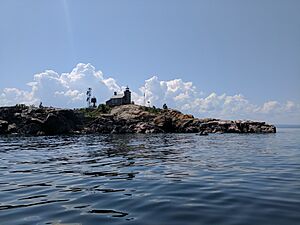Granite Island (Michigan) facts for kids
|
Native name:
Na-Be-Quon Island
|
|
|---|---|
| Geography | |
| Location | Lake Superior |
| Coordinates | 46°43′15″N 87°24′41″W / 46.72083°N 87.41139°W |
| Administration | |
| State | Michigan |
| County | Marquette County |
| Township | Marquette Township |
Granite Island is a small island, about 2.5-acre (1.0 ha) big. It's found in Lake Superior, which is one of the Great Lakes. The island is about 12 miles (19 km) northwest of Marquette, a city in Michigan's Upper Peninsula.
On the island stands the Granite Island Lighthouse. This lighthouse is also called the Granite Island Light Station. It is known as one of the oldest lighthouses still standing on Lake Superior. The island is part of Marquette Township, located in Marquette County, Michigan.
Island Geography
Granite Island is made of solid granite rock. It rises steeply, almost straight up, about 60 feet (18 m) above Lake Superior. Deep water surrounds the island.
Long ago, Native Americans called the island Na-Be-Quon. This name likely meant something like 'vessel'. They used a similar word, ishcoda nabequon, to describe a steamship, which roughly translated to 'fire vessel'.
Granite Island Lighthouse
The Granite Island Lighthouse helps ships navigate safely. In 1867, the United States Congress decided to build a lighthouse on the island. They set aside money for its construction.
Building the lighthouse was a big challenge. In 1868, a ship called the Haze brought a construction crew and supplies. Workers had to blast and flatten the top of the island to create a strong foundation. Life on the island was very difficult for the lighthouse keepers.
Today, the island is owned by private citizens. However, the United States Coast Guard still maintains an automated light on a tall gray steel tower. This light flashes white every 6 seconds and can be seen from about 10 nautical miles (19 km; 12 mi) away.
Modern Uses of the Island
Granite Island is a very remote place. But because it is so beautiful, with its unique shape and colors, many people photograph and draw it.
The island also plays a role in modern technology and research.
- Internet Relay Station: Northern Michigan University operates an internet relay station on the island. This station helps provide live online classes to students in the nearby rural area of Big Bay.
- Power Supply: The island's power comes from solar panels and wind generators. These are controlled remotely all year. Propane generators are also available as a backup power source.
- Weather Research: The island's owners have given a special weather research station to Northern Michigan University. This station collects important weather data. This information helps the National Weather Service predict weather near the shore. It also helps scientists study how evaporation affects the water levels in the Great Lakes. The strongest wind ever recorded on the island was 143 miles per hour (230 km/h) on January 18, 2003.
- NASA Station: In July 2018, NASA set up a station on the island. It measures radiation and cloud cover. This is part of a project called the Clouds and the Earth Radiant Energy System.
- Creative Retreats: The living quarters of the old light station are used by Northern Michigan University's English Department. They offer creative writing retreats there for students and faculty.
 | Janet Taylor Pickett |
 | Synthia Saint James |
 | Howardena Pindell |
 | Faith Ringgold |



